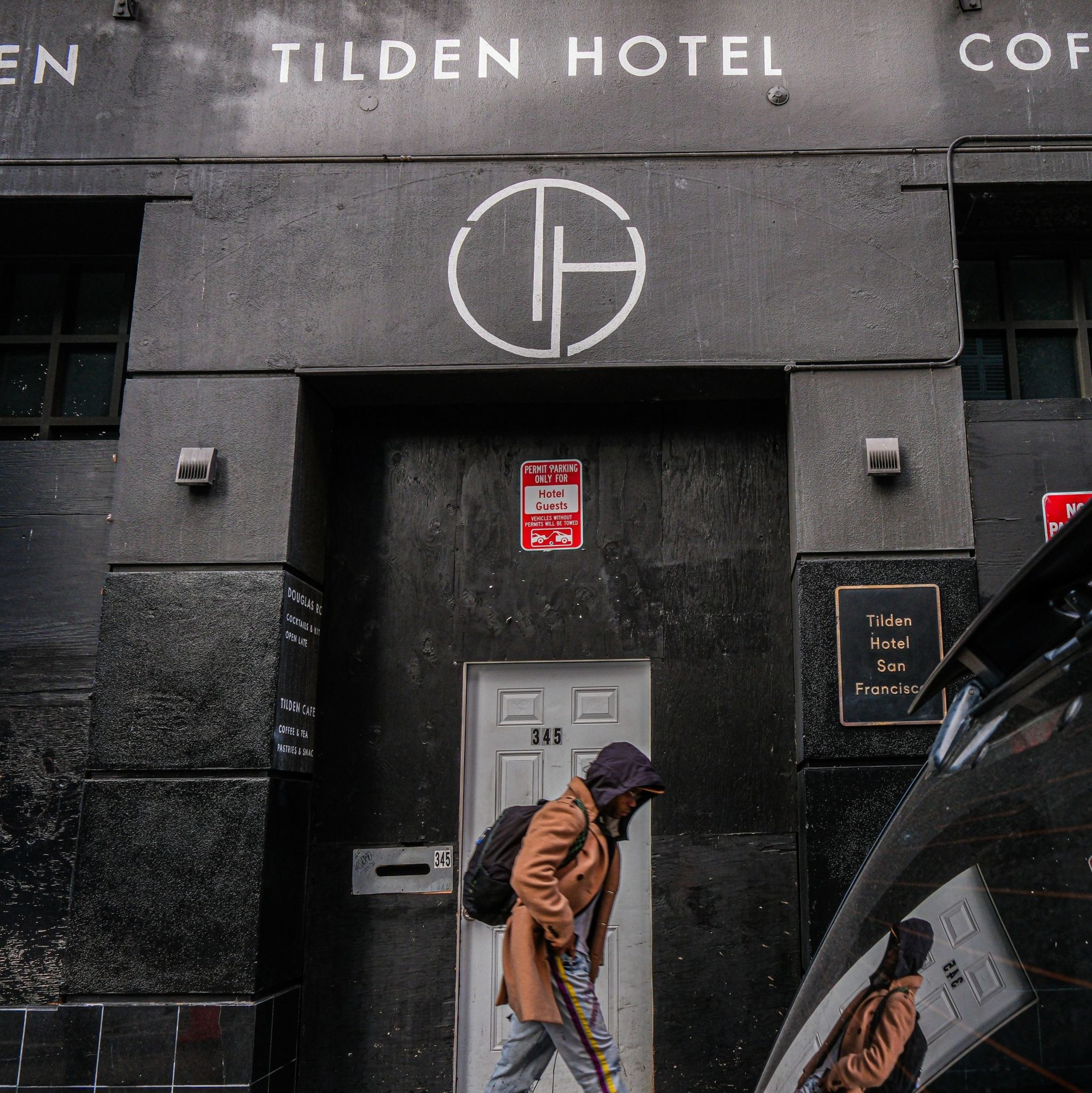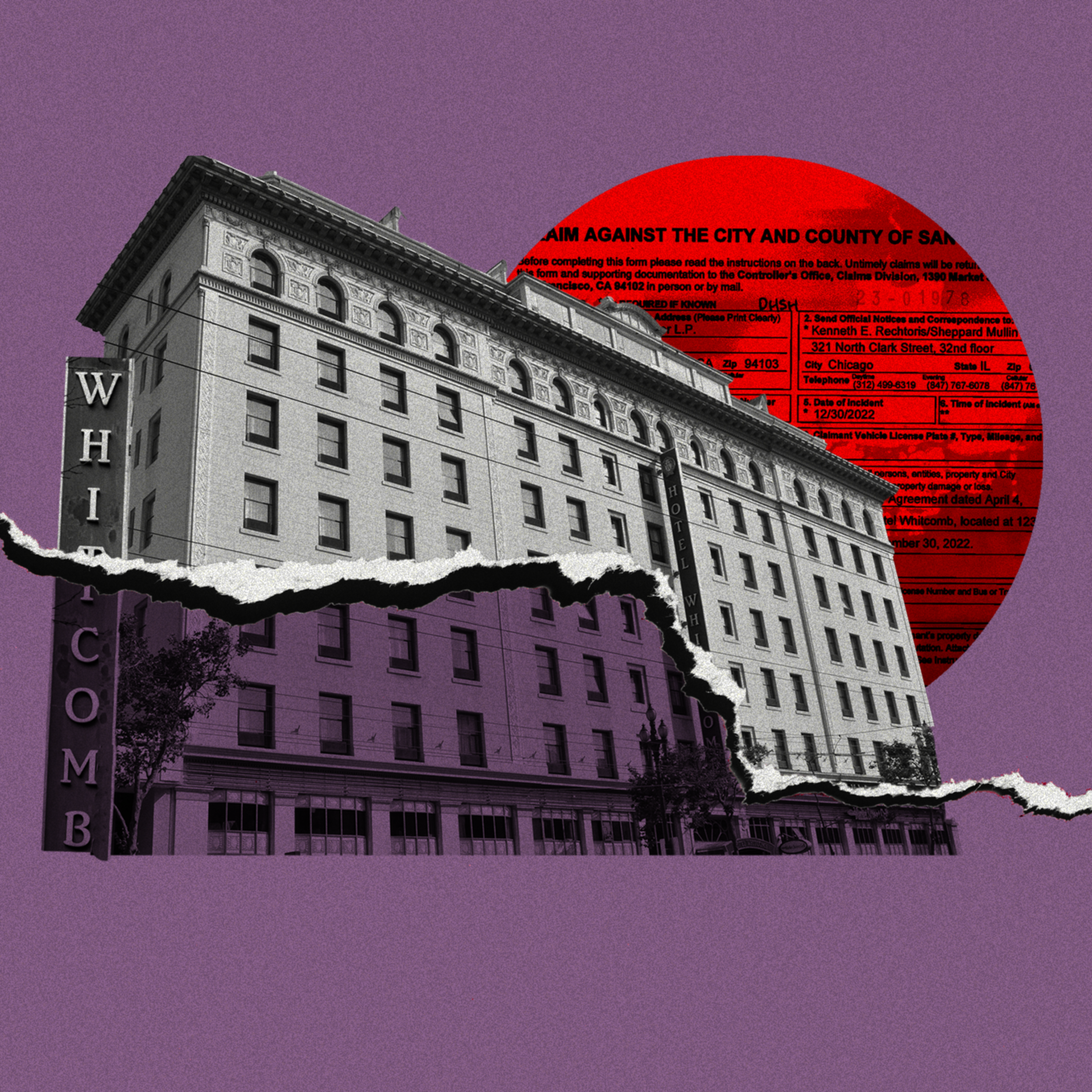The marble lobby of San Francisco’s Hotel Whitcomb was long a gathering place for power brokers, from the early 1900s, when it served as a temporary City Hall, through the term of Mayor Ed Lee, who often took his morning meetings at the cafe.
But nearly two years after receiving $32 million from the city to repair its damaged infrastructure and make up for lost revenue during the pandemic, the historic Market Street hotel, co-owned by New York real estate magnate Aby Rosen, is still a carcass in a neighborhood gasping for air.
The Whitcomb was one of 25 hotels that joined a $415 million initiative to shelter San Francisco’s homeless population during the pandemic. Owner RFR Holding, led by Rosen, received the largest cut of them all, totaling $89 million for a 33-month contract.
An unprecedented effort to move thousands of homeless people off the city’s streets ended with a controversial legacy. After the program ended, RFR and the owners of eight other hotels filed legal claims against the city for millions in damages. RFR alleged that program clients destroyed $29 million worth of property, and the hotel lost out on $35 million in revenue.
The city settled with RFR for $32 million, more than five times the amount any other hotel received, paying the company an additional $19.5 million on top of its initial contract. This brought the Whitcomb’s final receipt for the initiative to $108 million.
But while at least six hotels that received settlement funds have since reopened, the Whitcomb hasn’t filed any renovation permits, according to Department of Building Inspection records. Instead, RFR has been marketing the property for sale at a reported price (opens in new tab) of $75 million while keeping it vacant.
To neighbors of the building, that decision represents a violation, if not of the law, than of expectations the out-of-town investors would restore the hotel to its former glory. It also poses a major obstacle to rehabilitating one of the city’s most vital neighborhoods.


“They got money from the city and are not doing anything,” said Jeannie Kim, owner of SAMS American Eatery across the street from the hotel. “Everyone talks about the Twitter exit, but the Whitcomb was the true pillar of Mid-Market.”
Before the hotel shut down at the onset of the pandemic, its guests and staff made up more than half Kim’s business, she said, allowing her to open another restaurant next door in 2017.
She and her partners have since closed the second business, Fermentation Lab, because of a lack of foot traffic.
RFR Holding, which boasts a portfolio worth $16 billion, has removed the property from its website and in September filed a permit to decommission the hotel’s boilers. Industry sources familiar with the listing said the 459-room hotel’s value continues to plummet the longer it sits in the market, with nearby office buildings and similar properties trading for less than half pre-pandemic prices.
The total cost to the city to run the shelter at the Whitcomb for 33 months came to $134 million, including the settlement and a separate $25 million contract with the nonprofit Five Keys, which provided social services at the site.
“That does raise questions,” Board of Supervisors President Rafael Mandelman said. “Is this an expense [the city] would’ve chosen to make? Or would we have rather just bought the Whitcomb?”


A legal claim submitted by RFR stated that the settlement payout, received on top of the $89 million shelter contract, was calculated to “repair and renovate the location” to its pre-pandemic condition.
The Standard did not receive comment from RFR or attorneys who have represented the hotel’s business entity across years of contracts and lawsuits.
Jen Kwart, a spokesperson for the city attorney’s office, said RFR’s claim isn’t legally binding, and there was no agreement its owners would use the money to repair the property. She added that the city diligently investigated the company’s claims.
Nearby, the Tilden Hotel and Hotel Union Square, which received settlements of $2.9 million and $5.4 million, respectively, have also not reopened. The hotels’ owners couldn’t be reached. The Hotel Union Square in March 2023 pulled a permit for pipe and sprinkler maintenance, but it’s unclear if there are plans to reopen.
‘A pretty intense disaster’
At the peak of the hotel shelter program, more than 400 homeless people lived in the eight-story Hotel Whitcomb. Sources said the initiative was marked by chaos. Fueled by the desperation of the times, city officials rubber-stamped multimillion-dollar contracts, and staff were temporarily redistributed across city agencies and nonprofits to run the operations.
“It was such a chaotic time,” said Steve Good, CEO of Five Keys. “There was a mad rush to get people into shelter, which undoubtedly did save lives.”
The city temporarily sheltered more than 3,700 people over two years, with 1,835 moving into housing from the hotels. Proponents credit the program for staving off an increase in homelessness after traditional shelters drastically reduced capacity, and millions of people nationwide lost their jobs.

However, with the chaos came tragedy. Twenty-one people died of overdoses inside the Whitcomb during the program’s run, according to the Office of the Chief Medical Examiner. At least 755 people returned from the hotels to the streets or unknown locations. Ultimately, the city settled with nine hotels for a total of $59 million in damage claims.
While some city officials presumed the federal government would reimburse the expenses, the city hasn’t received $519 million in requested Covid relief funds, roughly half of which was spent on the shelter program, according to the Controller’s Office. There are doubts the city will ever recoup the cash under President Donald Trump, potentially adding to an $867 million budget deficit over the next two years.
“Why isn’t the city attorney bringing a lawsuit? Why is everyone so blasé about this?” asked Randy Shaw, executive director of the Tenderloin Housing Clinic. “This should be the biggest story in town.”
Ricky Matthews, a manager at the Downtown Streets Team during the pandemic, said he remembers visiting the Whitcomb once or twice a month to check on a client.

The lobby was littered with garbage, he said. Windows were broken, tables were missing legs, and the sound of screams reverberated through the hallways. His client, who was confined to a wheelchair and living on the fifth floor, was often imprisoned in their hotel room because the elevators didn’t work.
“It honestly felt apocalyptic,” Matthews said. “I don’t know what condition it was in before, but it was a pretty intense disaster.”
Good of Five Keys contends the hotel was in less-than-pristine shape before his nonprofit showed up. He acknowledged, however, that it was difficult for his staff to monitor clients suffering from mental illness and drug addiction due to the size of the hotel.
“It was just inventing new things that didn’t exist in the shelter system, like organizing food service, hospital care, and social workers into this behemoth, this huge building,” Good said. “It wasn’t a situation where if somebody was hoarding or refusing room checks, we could send them back out into the street, because we’re in the middle of a pandemic.”
Sources who have recently been inside the hotel say it’s in ragged shape; just a few rooms were renovated for showings. But the ground-floor lobby, embossed in marble and stone, remains grandiose. It was utilized in September for a public art installation during the More Than 2 Blocks of Art street festival.
Where did the money go?
Staff at the Hotel Garrett, a three-star boutique a block from the Whitcomb that was formerly called the Good Hotel, tell a more triumphant story. During the shelter-in-place period, drug dealers were known to work on the corner outside the hotel, and victims of drugs, homelessness, and mental illness suffered visibly on the surrounding streets.
But when The Standard visited the hotel last week, its fortunes appeared to have turned. Attendees of the nearby JPMorgan Healthcare Conference filled the lobby, which was adorned with abstract artwork and new furnishings.
Grace Doleno, a manager at the Garrett, credited the city’s settlement money for the hotel’s revival.
“Little by little, it changed,” Doleno said.


It remains unknown if RFR spent any of the $32 million settlement on the Whitcomb. But its larger business troubles hint at an empire crumbling (opens in new tab).
Rosen’s portfolio favors historic landmarks, such as The Reserve on Battery Street, and his expensive party lifestyle (opens in new tab) has come under scrutiny as RFR struggles to pay commercial debts taken out before the pandemic.
SAMS owner Kim, who sits on the board of the neighborhood Community Benefit District, said businesses are fed up with the Whitcomb sitting vacant.
“The bones of the building are still great,” she said. “It needs to be sold and fixed. Then we can talk about this area getting revitalized.”

